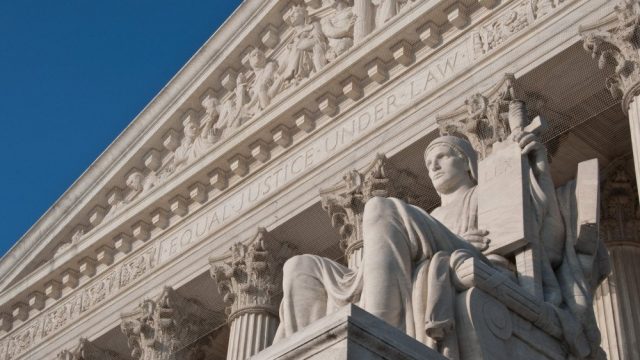Sign Me Up For Supreme Court Reform

The sudden death of conservative Supreme Court Justice Antonin Scalia has set off a firestorm of partisan debate, ironically with each side trying to posture themselves as supporting a non-partisan and non-political approach.
Particularly hilarious is state Rep. Kyle Oversen – titular chairwoman for the North Dakota Democrats and a not-yet-graduated law student – lecturing Senator John Hoeven over his call for Obama to refrain from nominating a candidate to replace Scalia.
Of course Hoeven doesn’t want Obama to pick someone. And if Obama does sent the Senate a nominee, of course Hoeven is going to oppose that nominee (less certain is whether or not Senator Heidi Heitkamp will back Obama’s play).
President Barack Obama has presided over a lawless administration, and one of the few brakes on it has been the kinda-sorta conservative majority on the high court, as inconsistent as they’ve been.
As James Kerian wrote here on SAB yesterday: “If Justice Ginsburg’s writings become the majority decision rather than the dissenting opinion the people of this country will have lost the freedom to own handguns, any vestige of religious freedom and any limits on abortion. Such a court would grant to the EPA the ability to legislate and to Congress the ability to determine what may or may not legally be said about politicians.”
That’s not hyperbole. The Supreme Court has enormous power over public policy. It would be stupid for anyone to refrain from treating the appointment of Supreme Court justices as exactly the political exercise it is.
The question is, can we reform the process? Tom Dennis, writing the editorial for the Grand Forks Herald today, proposes one potentially very good idea for SCOTUS reform and one awful idea.
First the good idea:
The first reform is to set limits on the justices’ terms. Law professor Orin Kerr makes the case in Tuesday’s Washington Post:
“Imagine each Justice was appointed to an 18-year term instead for life. With nine Justices, you would have a vacancy every two years. Every presidential election would mean two vacancies at stake.”
Over time, that would moderate the court’s power by making it more responsive—though not hyper-responsive, like the U.S. House—to the American electorate.
“It’s often said that elections have consequences,” Kerr writes.
“But thanks to life tenure, elections don’t have nearly as much consequence as they should have on the Supreme Court.”
Sounds good to me. I’m skeptical that Congress would be willing to pass any such reform, or that any given President is going to be willing to dilute their authority to make these sort of lifetime appointments, but if we could pass that reform I think I’d probably support it.
Here’s the ironic thing: This move would probably make the Supreme Court even more political. That’s because,with term limits, we’re tying appointments even more closely to electoral outcomes. But that’s ok! Politics is democracy. It is the means by which we resolve social and policy debates. And the process is already political anyway. This just makes the consequences less dire.
But this idea from Dennis isn’t so good:
The second reform is one of the great lessons North Dakota can teach the nation, and that is to require a supermajority of justices to agree before the court can declare a law unconstitutional.
In North Dakota, the rule is four out of five. If only three justices of the five-justice North Dakota Supreme Court vote to overturn a law, the law stays on the books.
In Washington, a similar process should hold. Again, the Constitution wisely demands huge national supermajorities before amendments can become law. It’s not a strength to let shifting 5-4 majorities in bitterly contested court rulings write the permanent law of the land. It’s a weakness, and it should be changed.
I think Dennis is identifying the wrong problem. The issue isn’t that the Supreme Court strikes down too many laws. The problem is that the Supreme Court upholds far too much bad, overreaching, constitutionally dubious policy.
Like that time the Supreme Court upheld forced sterilization for people defined as mentally deficient by the government in Buck vs. Bell. Or the time the Supreme Court upheld the criminalization of anti-war political speech under the Espionage Act in Schenk vs. U.S. (that’s where the term “you can’t shout fire in a crowded theater” came from, by the way).
Guess who upheld the forced internment of Asian Americans during WWII ordered by President Franklin Roosevelt? The Supreme Court in a 6-3 decision in Korematsu vs. U.S.
I’d rather a Supreme Court which errs on the side of striking down too many laws than one which upholds awful ones.
I’m tempted to say that we should do the opposite of what Dennis wants, which is to say that laws can only be sustained through a super majority vote, but that would result in a lot of laws being struck down simply because they couldn’t get super majority support from the justices. I’m not sure that’s so good either.
So, leave that at the status quo, I think.




